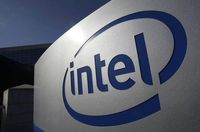Intel, the American electronics giant, has announced that it will require special licenses to export certain advanced artificial intelligence chips to China. This decision follows a stark warning from Nvidia, another leading chip manufacturer, that it could face losses of up to $5.5 billion due to new restrictions imposed by Washington on the sale of its AI processors specifically designed for the Chinese market.
The news, reported by the Financial Times, highlights the tightening grip of U.S. regulations on technology exports, particularly in the semiconductor industry. According to the report, Intel's new CEO, Lib Bo Tan, informed clients last week that chips with a total memory bandwidth of 1400 gigabytes per second or more will necessitate a special export license. Additionally, chips that provide an input/output bandwidth of 1100 gigabytes per second or more will also fall under this requirement. If the total bandwidth for both metrics reaches 1700 gigabytes per second or more, a license will be mandated as well.
This regulatory shift has raised concerns within the tech community, as it could significantly impact the operations of companies that rely on these advanced chips. Notably, the report points out that Intel's upcoming Goudi series chips and Nvidia's ITCH20 chips exceed these thresholds by a considerable margin, potentially complicating their export strategies to China.
In recent months, the Dutch company ASML, which specializes in chip manufacturing equipment, has also expressed worries regarding its financial outlook, further underscoring the ripple effects of U.S. trade policies. The tightening restrictions are seen as part of a broader strategy by the U.S. government to limit China's access to advanced technology, particularly in sectors deemed critical to national security.
As the implications of these restrictions unfold, the stock market has already reacted. Intel's shares dropped by more than 3% on Wednesday, April 16, 2025, mirroring declines in other semiconductor companies. This downturn reflects growing apprehension among investors regarding the future of semiconductor firms amid changing trade policies under President Donald Trump's administration.
Despite the significant developments, Intel has not yet responded to requests for comment from Reuters regarding the new export requirements. The uncertainty surrounding these regulations raises questions about the future of U.S.-China tech relations and the potential for further restrictions that could inhibit the growth of technology companies.
Industry analysts are closely monitoring the situation, as the semiconductor sector has been a focal point in the ongoing trade tensions between the U.S. and China. The ramifications of these export controls could extend beyond immediate financial impacts, potentially stifling innovation and collaboration in a field that is pivotal for both economic and technological advancement.
As companies like Intel and Nvidia navigate these challenges, the broader implications for the global tech landscape remain to be seen. The semiconductor industry is already grappling with supply chain issues exacerbated by the COVID-19 pandemic, and these new restrictions could further complicate an already delicate situation.
In conclusion, the requirement for special licenses to export advanced AI chips to China marks a significant shift in U.S. trade policy, reflecting growing concerns about national security and technological supremacy. As companies adapt to these changes, the long-term effects on the semiconductor market and U.S.-China relations will warrant close attention.





